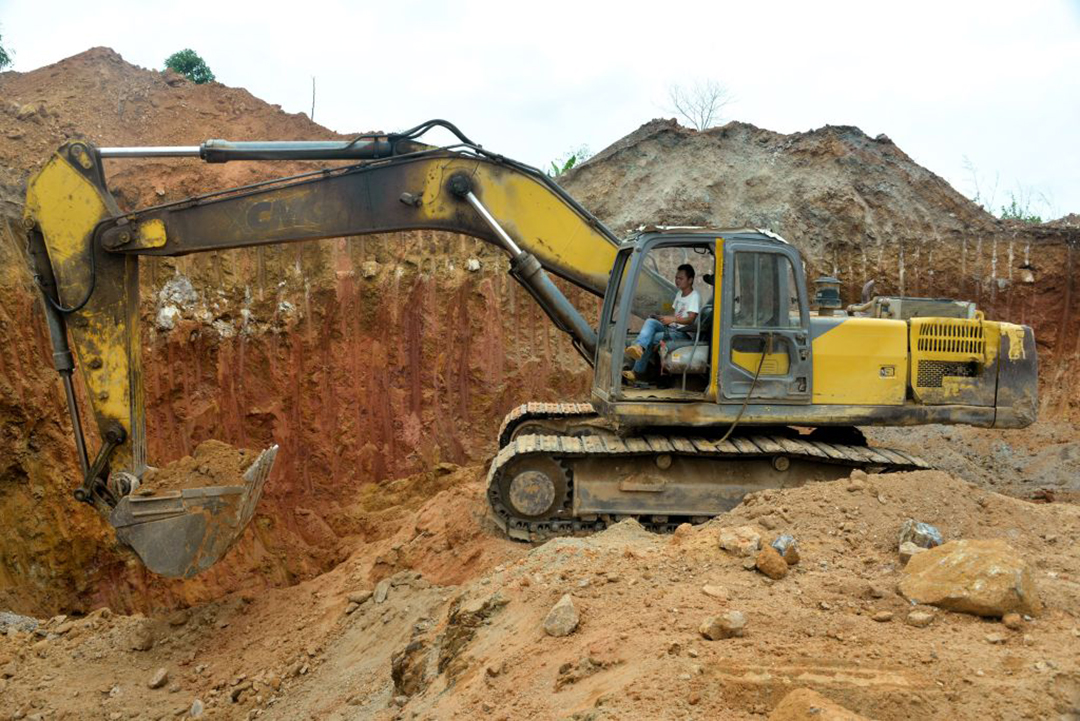China’s Iron Ore Mining Draws Ire in Cameroon
ADF STAFF
Cameroonian citizens are pushing back against what they say are false promises of an economic windfall coming from Chinese investors.
Several hundred people in the small coastal town of Lolabé protested on May 23 a recently announced government agreement giving iron ore mining rights to the subsidiary of a Chinese state-owned company called Sinosteel.
The demonstration brought controversy and fresh scrutiny to the deal, as locals say these contracts do little to help the community and could be awarded to Cameroonian businesses.
“Financially, this is an economic crime, a real incitement to revolt, a mafia trick,” politician Jean Michel Nitcheu said in a statement issued days after the agreement was signed on May 6.
The contract gives Sinosteel CAM S.A. a 50-year claim on the mine, which is said to hold 632.8 million metric tons of high-grade iron ore.
Sinosteel agreed to pay $3.69 per metric ton to Cameroon with plans to extract 10 million metric tons of iron per year. However, Sinosteel also plans to enrich the ore from 33% iron to 60%, which drastically improves its market value to an estimated $2,400 per metric ton.
The profit margin prompted Michel Nitcheu to call for a parliamentary inquiry.
“We cannot accept that a handful of lawless individuals sacrifice future generations,” he said. “A foreign company cannot carve out the lion’s share of a mining contract by investing only [$676 million] in a mining project over 63 years whose revenues will amount to [$96.3 billion].
“Even in the days of slavery, such fraud would never have flourished. This is without a doubt the heist of the century.”
Parliament member and former presidential candidate Cabral Libii said he organized the protest in Lolabé because of the outrage surrounding the mining contract’s financial details.
According to the terms, Sinosteel will invest $676 million in Cameroon as part of the mining project, with plans to build a pipeline to transport the ore to the port, a mineral terminal, a processing plant for enrichment and a power plant.
“Whatever the investment they make in Cameroon, their profitability remains enormous,” Libii said in a video posted to Facebook on May 17. “Imagine with a deposit like this, what Cameroon would be able to produce per year. It’s just not acceptable.”
Sinosteel has not said when mining will begin, but under Cameroonian code the company must start within five years from the permit date.
Cameroonian Minister of Mines Dodo Ndoke Gabriel has said the project will create at least 600 direct jobs and 1,000 indirect jobs.
The mine, near the coastal town of Lobé, is in the southern region, 40 kilometers south of the port town of Kribi and 200 kilometers southeast of the country’s economic capital, Douala.
Neither town has a deep-water port, but Chinese state-owned firms have an extensive project underway to build the largest seaport in Central Africa near Lolabé.
State-run China Harbour Engineering Corp., known locally as CHEC, is overseeing port construction.
The first and second stages of the new seaport complex will cost $1.3 billion. CHEC also is building a $453 million highway connecting the port, has a contract to dredge the port of Douala, and has signed a contract to build a railway to the Mbalam iron ore deposit deep in the country’s southeast.
Since the 2009 contract to build the port was signed, 10 Chinese firms, including CHEC, have secured mining concessions for iron ore, bauxite and other minerals.
Like Sinosteel, CHEC promised an economic revival in the area. But frustration is mounting as locals continue to feel left behind.
Economist Fred Duven, a member of Cameroonian civil society group Dynamique Citoyenne, said people are angry at the government for giving mining licenses to Chinese firms while qualified Cameroonians are ready to develop their country.
“Chinese companies come here with their manpower — they don’t help the community,” he told Voice of America. “Cameroonians who are worthy and wealthy can indulge into exploration business and can create greater employment than the direct employment the convention is trying to purport, which depends on the whims and caprices of the Chinese company.”
Fishermen who have refused to move from Lolabé to a town specially built by CHEC were among those joining Libii’s recent protest.
At the end of his video, Libii held his hand together in prayer as he exhorted Cameroon’s President Paul Biya, “Don’t sign this permit” and called for further rallies.
“People of Cameroon,” he said, “let’s rise against what the minister of mines signed. It’s a criminal act.”


Comments are closed.